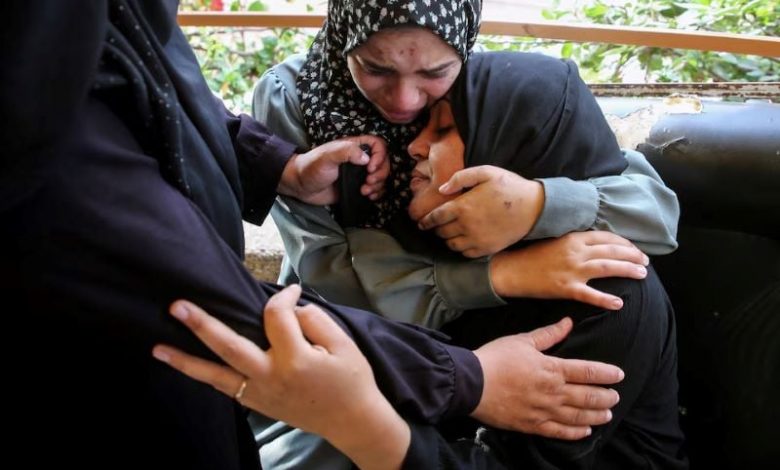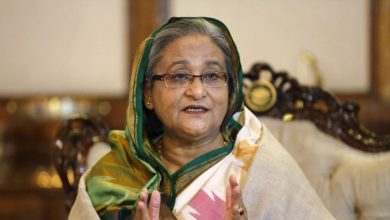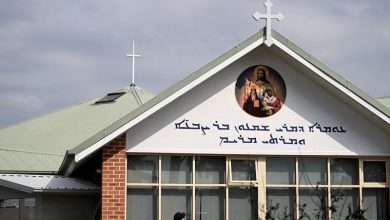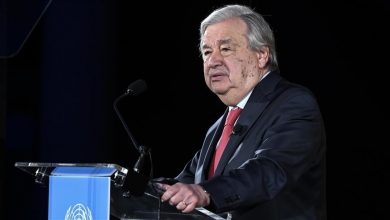Israeli airstrikes kill at least 50 in Gaza as forces close in on Jabalia

Israeli military strikes killed at least 50 Palestinians across the Gaza Strip as Israeli forces tightened their squeeze around Jabalia in the north of the enclave on Tuesday, amid fierce battles with Hamas-led fighters.
Palestinian health officials said at least 17 people were killed by Israeli fire near Al-Falouja in Jabalia, the largest of Gaza’s eight historic refugee camps, while 10 others were killed in Bani Suhaila in eastern Khan Younis in the south when an Israeli missile struck a house.
Earlier on Tuesday, an Israeli airstrike destroyed three houses in the Sabra suburb of Gaza City, and the local civil emergency service said they recovered two bodies from the site, while the search continued for 12 other people who were believed to have been in the houses at the time.
Eight others were killed when a house was struck in the Nuseirat camp in central Gaza.
The Gaza health ministry said one doctor was killed when he tried to help people wounded by Israeli strikes in Al-Falouja in Jabalia. It added that several medics were wounded when their ambulance came under Israeli fire in the northern and southern Gaza Strip.
Jabalia has been the focus of an Israeli offensive for more than 10 days, with troops returning to areas of the north that came under heavy bombardment in the early months of the year-long war.
The operation has raised concerns among Palestinians and U.N. agencies that Israel wants to clear residents from the north of the crowded enclave, a charge it has denied. Residents said Israeli forces destroyed dozens of houses in the past 10 days.
On Tuesday, the Israeli military said troops had killed dozens of fighters in the Jabalia area over the past day, including a unit that fired an anti-tank missile at them.
The United Nations human rights office said the Israeli military appeared to be “cutting off North Gaza completely from the rest of the Gaza Strip.”
“Gaza families are facing unimaginable fear, loss of loved ones, confusion, and exhaustion. People must be able to flee safely, without facing further danger,” Adrian Zimmerman,
ICRC Gaza head of sub-delegation, said in a statement.
The Israeli military’s administrative unit, Cogat, which oversees aid and commercial shipments to Gaza, said on Tuesday that operations in Jabalia were targeting terrorist infrastructure and operatives embedded inside civilian areas. It said it was facilitating humanitarian, and in particular medical aid to residents.
Hamas deniesit embeds its operatives amongst civilians.
Jabalia encricled
The Israeli military has now encircled the Jabalia camp and sent tanks into nearby Beit Lahiya and Beit Hanoun towns, with the declared aim of stamping out Hamas fighters who are trying to regroup there.
The Israeli military has told residents to leave their homes and head to safety in southern Gaza. Palestinian and U.N. officials say there is no safe place in Gaza.
Hamas’ armed wing said fighters were engaged in fierce battles with Israeli forces in and around Jabalia.
Gaza’s health ministry said the army ordered the three hospitals operating there to evacuate but medical staffers said they were determined to continue their services.
Cogat said in recent days it had facilitated the transfer of 33 patients, medical staff and accompanying personnel from the Kamal Adwan Hospital in the north to functioning facilities elsewhere in Gaza.
It said it has also provided 68,650 litres of fuel to hospitals and coordinated the delivery of 800 blood transfusion units.
Ismail Al-Thawabta, the director of the Hamas-run Gaza government media office, said Israel was trying to give a misleading impression and that its forces had been preventing ambulance and civil emergency teams from recovering the bodies of dozens of people from the streets.
Hussam Abu Safiya, director of Kamal Adwan Hospital, one of the three hospitals in northern Gaza, said they were facing serious shortages of food, medication, and fuel, that could soon impact patients in their facilities.
“There is a stark shortage of consumables and supplies began to run out. Milk is running out, and everything available is depleting and we could face a humanitarian disaster that would impact those in the maternity and the neonatal units,” said Abu Safiya in a video appeal to international relief and human rights groups.
The northern part of Gaza is home to well over half the territory’s 2.3 million people. Around 400,000 people remain, according to United Nations estimates.
Israel launched the offensive against Hamas after the militant group’s Oct. 7 attack on Israel, in which 1,200 people were killed and around 250 taken hostage to Gaza, by Israeli tallies. More than 42,000 Palestinians have been killed in the offensive so far, according to Gaza’s health authorities.





